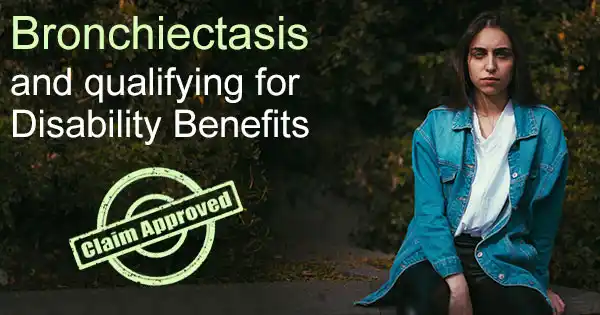Bronchiectasis and Qualifying for SS Disability Insurance
Can I get disability benefits if I am suffering from the effects of Bronchiectasis?
Author: Attorney Lloyd Bemis
Updated:10/2/2024
Summary: Can I get disability benefits if I am suffering from the effects of Bronchiectasis?
First you must meet the SSA’s financial requirement: You must have worked long enough, recently enough, and not made over a predetermined level of income.
Second you must meet the medical requirements:
The SSA lists bronchiectasis as an impairment under Section 3.07.
In order to qualify you must provide Social Security with medical imaging that shows the presence of bronchiectasis; AND
You must provide proof of three hospitalizations due to complications caused by bronchiectasis in the past 12 months.
Each hospitalization must last at least 48 hours, including hours in a hospital emergency department immediately before hospitalization, and occur at least 30 days apart.
If you don’t meet the requirements of Social Security’s listing, you must prove that you are unable to work because of limitations caused bronchiectasis. For example, the ability to breathe properly can impact many physical tasks of work.
Between 350,000 and 500,000 adults in the United States suffer from bronchiectasis, a condition where inflammation permanently damages the bronchial tubes of the lungs. As a person breathes, air travels in the lungs through airways called bronchi. When bronchiectasis occurs, the airway walls become thickened and damaged, and as the walls are scarred, the bronchi are no longer able to drain normal secretions effectively. As a rhttps://www.brrlaw.com/wp-admin/post.php?post=33423&action=edit#esult, mucus builds up causing inflammation and infection, leading to loss of lung function over time. Bronchiectasis may occur throughout the lungs or only in certain airways; the more widespread the damage, the more serious the condition. More women than men are affected by bronchiectasis and risk of developing the condition increases with age. If you are suffering from the effects of Bronchiectasis you may qualify for disability benefits.

If you are suffering from the effects of Bronchiectasis you may be entitled to Social Security or LTD disability benefits. Seek help today, deadlines may apply. Call 512-454-4000 Today.
Bronchiectasis usually begins as a chronic cough, but as the condition progresses other symptoms appear, including:
- Coughing up blood;
- Shortness of breath;
- Abnormal breathing sounds in the chest, such as wheezing;
- Frequent respiratory infections;
- Coughing up large amounts of thick mucus;
- Chest pain;
- Weight loss;
- Fatigue;
- Thickening of skin under the nails and toes (known as clubbing).
These conditions and accompanying symptoms can affect your ability to maintain employment.
Approximately 40% of cases of bronchiectasis are idiopathic, meaning the cause is unknown.
Although there is currently no cure for bronchiectasis, individuals who obtain treatment early typically live a normal life. Treatment of bronchiectasis concentrates on managing symptoms and preventing infection and further damage. If there is an underlying disease causing bronchiectasis, such as cystic fibrosis, a doctor will treat that disease. In other cases, the most common treatments and medications prescribed include:
- Antibiotics to treat infections;
- Expectorants to clear mucus from airways;
- Chest physiotherapy – treatments performed by physical therapists and respiratory therapists to clear airways and drain the lungs;
- Bronchodilators such as albuterol (Proventil) and tiotropium (Spirival);
- Medications to thin mucus;
- Dietary supplements. Vitamin D deficiency is sometimes found and indicative of the severity of the condition
- Breathing exercises;
- Oxygen therapy.
Demonstrating that you are following your doctor’s treatment plan is an important part of qualifying for disability benefits.
Qualifying for Disability for Bronchiectasis
Long-term effects of bronchiectasis, such as heart failure, respiratory failure, chronic lung infections and brain abscesses can easily be disabling and prevent an individual from working.
The Social Security Administration lists bronchiectasis as an impairment in its Blue Book under Section 3.07 and there are basically two ways to qualify for Social Security Disability Income if you suffer from bronchiectasis: 1) you must meet the specific criteria stated in Social Security’s listing; or 2) prove that you are unable to work due to your disability.
In order to qualify under Social Security’s listing, you must submit the following:
- You must provide Social Security with medical imaging that shows the presence of bronchiectasis; AND
- You must provide proof of three hospitalizations due to complications caused by bronchiectasis in the past 12 months. Each hospitalization must last at least 48 hours, including hours in a hospital emergency department immediately before hospitalization, and occur at least 30 days apart.

If you don’t meet the requirements of Social Security’s listing, you must prove that you are unable to work because of limitations caused bronchiectasis to be eligible for disability benefits.
Social Security will conduct a Residual Functional Capacity Assessment (RFC) to review all your impairments and how they impact your ability to work. For example, the ability to breathe properly can impact many physical tasks of work. Shortness of breath can prevent lifting items or walking up or down stairs; fatigue, if severe, can even prevent sedentary work. Social Security is interested in whether or not you can do any job, not just your previous job, and will employ a predetermined set of rules based on age, education and work history to decide if there is less strenuous work you can do.
If you have a work history of physical labor and minimal formal education, you may qualify for SSDI if you can no longer do physical work.
If you are older than 55 and are evaluated for sedentary work, you could still be found disabled if you lack the job skills to work at another job, and you may be found incapable of sedentary work if the only jobs you can do are limited because of exposure to environmental hazards such as dust and airborne irritants.
Additionally, you may be eligible for Social Security Disability benefits if you have another impairment; for example, high blood pressure.
Applicants often have more than one illness or injury that prevents them from working full time. By itself one disorder may not meet the requirements of an impairment as stated in Social Security’s Blue Book, but if you have multiple medical conditions, Social Security must consider how those health issues, combined together, limit your ability to hold a job and perform necessary daily tasks.
If you have bronchiectasis and it has impacted your ability to work, you may be eligible for Social Security disability benefits.
Filing for SSDI can be a complicated matter and most applicants are initially denied, but if you have an experienced disability attorney to advise you and guide you through the often confusing and lengthy process, you can avoid common pitfalls that lead to the delay or rejection of your claim.
In order to qualify for Social Security Disability, you will need to satisfy a few specific requirements in two categories as determined by the Social Security Administration.
The first category is the Work Requirements which has two tests.
- The Duration of Work test. Whether you have worked long enough to be covered under SSDI.
- The Current Work Test. Whether you worked recently enough for the work to actually count toward coverage.
The second category is the Medical Eligibility Requirement.
- Are you working? Your disability must be “total”.
- Is your medical condition severe? Your disability must be “severe” enough to interfere with your ability to perform basic work-related activities, such as walking, sitting, and remembering.
- Is your medical condition on the List of Impairments? The SSA has a “List of Impairments” that automatically qualify as “severe” disabilities. If your disease is not listed this does not mean you cannot get disability, it means you must prove you cannot maintain employment due to your limitations.
- Can you do the work you did before? SSDI rules look at whether your medical condition prevents you from doing the work you did prior to developing the condition.
- Can you do any other type of work? If you cannot do your prior work, an evaluation is made as to whether you can perform any other kind of work.
More details can be found on our Qualifying for Disability page.
Disability benefits are an important source of income for those who are unable to work. If you are not able to work due to accident or illness, you may be eligible for Social Security Disability or Long Term Disability benefits. If you have applied for benefits and been denied, contact the attorneys at Bemis, Roach and Reed for a free consultation. Call 512-454-4000 and get help NOW.
Social Security Disability Benefits for Chronic Obstructive Pulmonary Disease
Can Irritable Bowel Syndrome qualify me for Disability?
Texas Lung Cancer Social Security Lawyers


![]()
Your Free Initial Consultation
Call now:
At Bemis, Roach and Reed, if we can't help you, we will try to find the right attorneys for you.
We offer each of our prospective clients a free no obligation one hour phone or office consultation to see if we can help you and if you are comfortable with us. We know how difficult a time like this can be and how hard the decisions are. If we can be of assistance to you and help you find a solution to your issue we will even if that means referring you to another attorney.
Let's get you Started:
If you could provide us with some basic information about your claim we will get right back with you with a free case evaluation and schedule your Free Consultation Today.





